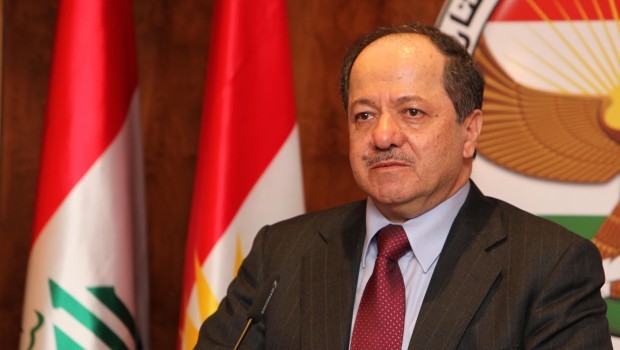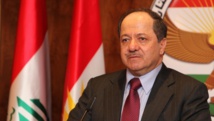The Kurdish offensive threatens the links between the city of Mosul, the main IS stronghold in Iraq, and territory the militants control in neighbouring Syria.
"During the past 48 hours, the peshmerga opened two main routes to Mount Sinjar," Barzani said during a visit to Mount Sinjar, adding: "We did not expect to achieve all these victories."
In addition to breaking through to the mountain, "a large part of the centre of the town of Sinjar was also liberated," he said of the district's main settlement to the south.
The Kurdish regional president said the peshmerga might join an operation to retake Mosul itself.
"We will take part if the Iraqi government asks us, and of course we will have our conditions," he said, without specifying what these might be.
The Kurdistan Regional Security Council said on Sunday that peshmerga forces were advancing inside the town of Sinjar, "engaging and suppressing (IS) positions" with the support of air strikes by international forces.
- Sweeping offensive -
Explosives disposal teams also cleared key roads north of Mount Sinjar, it said.
The US-led coalition said its forces launched 13 air strikes against IS in northern and western Iraq on Sunday, including four near Sinjar.
The Syrian Observatory for Human Rights monitor reported "at least 12" coalition air strikes on IS positions north of Syria's second city Aleppo on Sunday.
IS spearheaded a sweeping offensive that has overrun much of Iraq's Sunni Arab heartland since June, presenting both an opportunity for territorial expansion and an existential threat to the country's Kurdish region.
Multiple Iraqi divisions collapsed in the early days of the militant advance, clearing the way for the Kurds to take control of a swathe of disputed northern territory that they have long wanted to incorporate into their autonomous region over Baghdad's objections.
But after pushing south towards Baghdad, IS then turned its attention to the Kurds, forcing them back towards their regional capital Arbil in a move that helped spark US air strikes against the jihadists.
Backed by the raids, which are now being carried out by a coalition of countries, Kurdish forces have clawed back significant ground from IS.
The conflict seems set to redraw the internal boundaries of Iraq in favour of broader Kurdish control in the north.
- Trapped Yazidis -
In his remarks on Mount Sinjar, Barzani said: "We will not leave an inch of the land of Kurdistan for (IS), and we will strike (IS) in any place it is located."
That siege was broken and many of the civilians evacuated, but others stayed behind and were again besieged by the jihadists in October.
While both Kurdish and federal forces have made gains against IS, the group remains a potent threat, holding extensive territory in Iraq and eastern Syria.
IS began a major assault on Saturday on the strategic town of Baiji south of Mosul, sparking fighting that lasted into Sunday.
The province's governor and an army officer said the attack was repulsed, while two other officers said that pro-government forces lost ground.
Iraqi Prime Minister Haider al-Abadi meanwhile travelled to Kuwait on Sunday for talks on the security situation among other issues, his office said.
The visit came just days after the UN said Iraq could delay payment of a final $4.6 billion in war reparations for its 1990 invasion of Kuwait due to the "extraordinarily difficult security circumstances".
------------------------------------------------------------------------------------------------------------------
"During the past 48 hours, the peshmerga opened two main routes to Mount Sinjar," Barzani said during a visit to Mount Sinjar, adding: "We did not expect to achieve all these victories."
In addition to breaking through to the mountain, "a large part of the centre of the town of Sinjar was also liberated," he said of the district's main settlement to the south.
The Kurdish regional president said the peshmerga might join an operation to retake Mosul itself.
"We will take part if the Iraqi government asks us, and of course we will have our conditions," he said, without specifying what these might be.
The Kurdistan Regional Security Council said on Sunday that peshmerga forces were advancing inside the town of Sinjar, "engaging and suppressing (IS) positions" with the support of air strikes by international forces.
- Sweeping offensive -
Explosives disposal teams also cleared key roads north of Mount Sinjar, it said.
The US-led coalition said its forces launched 13 air strikes against IS in northern and western Iraq on Sunday, including four near Sinjar.
The Syrian Observatory for Human Rights monitor reported "at least 12" coalition air strikes on IS positions north of Syria's second city Aleppo on Sunday.
IS spearheaded a sweeping offensive that has overrun much of Iraq's Sunni Arab heartland since June, presenting both an opportunity for territorial expansion and an existential threat to the country's Kurdish region.
Multiple Iraqi divisions collapsed in the early days of the militant advance, clearing the way for the Kurds to take control of a swathe of disputed northern territory that they have long wanted to incorporate into their autonomous region over Baghdad's objections.
But after pushing south towards Baghdad, IS then turned its attention to the Kurds, forcing them back towards their regional capital Arbil in a move that helped spark US air strikes against the jihadists.
Backed by the raids, which are now being carried out by a coalition of countries, Kurdish forces have clawed back significant ground from IS.
The conflict seems set to redraw the internal boundaries of Iraq in favour of broader Kurdish control in the north.
- Trapped Yazidis -
In his remarks on Mount Sinjar, Barzani said: "We will not leave an inch of the land of Kurdistan for (IS), and we will strike (IS) in any place it is located."
That siege was broken and many of the civilians evacuated, but others stayed behind and were again besieged by the jihadists in October.
While both Kurdish and federal forces have made gains against IS, the group remains a potent threat, holding extensive territory in Iraq and eastern Syria.
IS began a major assault on Saturday on the strategic town of Baiji south of Mosul, sparking fighting that lasted into Sunday.
The province's governor and an army officer said the attack was repulsed, while two other officers said that pro-government forces lost ground.
Iraqi Prime Minister Haider al-Abadi meanwhile travelled to Kuwait on Sunday for talks on the security situation among other issues, his office said.
The visit came just days after the UN said Iraq could delay payment of a final $4.6 billion in war reparations for its 1990 invasion of Kuwait due to the "extraordinarily difficult security circumstances".
------------------------------------------------------------------------------------------------------------------









 Home
Home Politics
Politics











